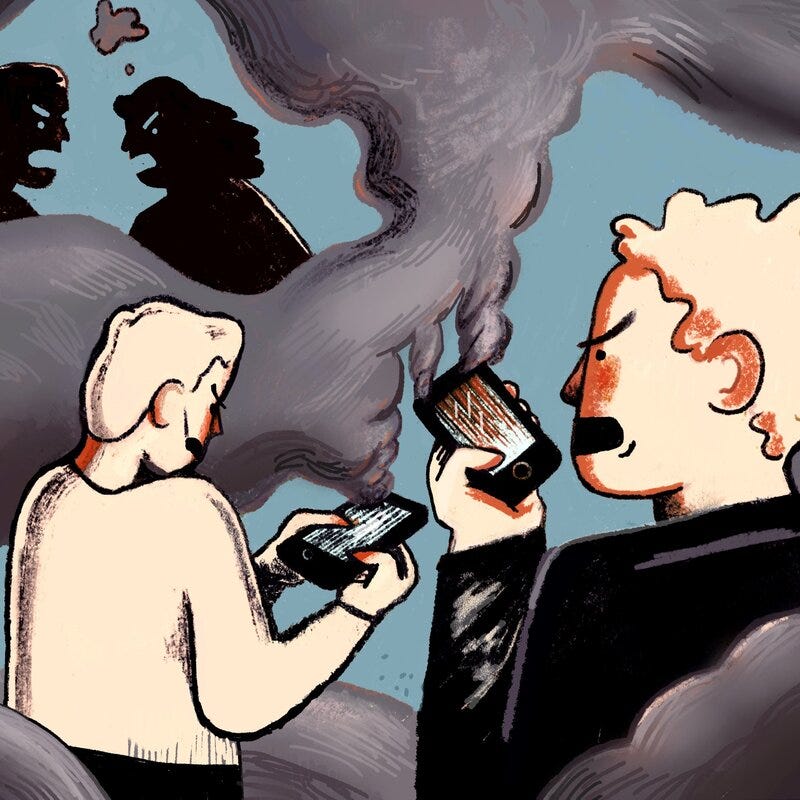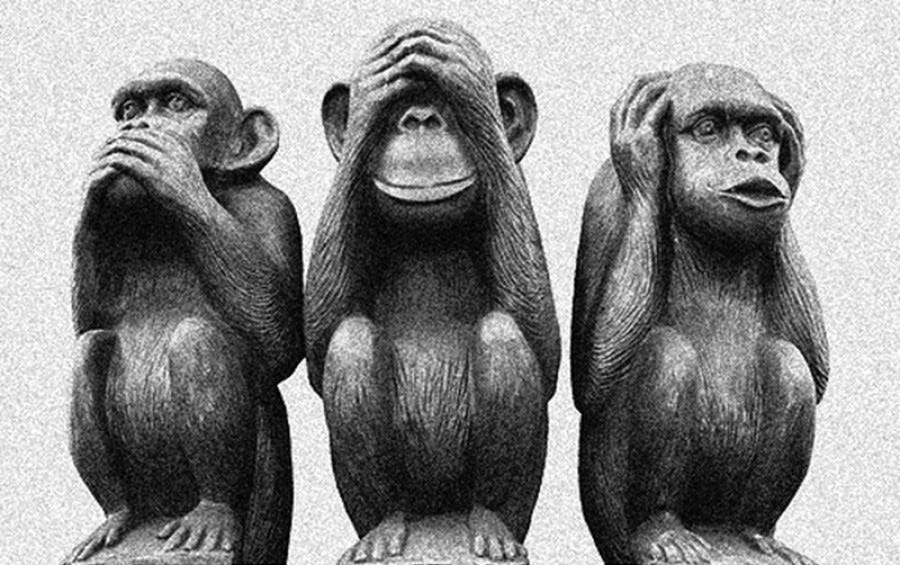The Psychopathology of Modern Politics
It is self-evident that the political paradigm of the present is completely unwell and is creating instability, division, and neurosis among the population at large. It is amplifying negative emotions, maladaptive thinking patterns, and discouraging empathetic communication and connection between individuals. It magnifies group identity, eliminates nuance, and reduces the individual to having no valid voice outside of tribal affiliation. Discourse and discussion is replaced by slogans and slander. Individuals surrender their reasoning and independent thought to mass political movements. They are preyed upon by political power holders who benefit from predictable constituents who are hypnotized by virtue signaling.
The most vital mechanism that keeps things operating this way is the 2-party system. This system encourages individuals to ignore their own contributions to the predicaments of society and their individual shortcomings, and instead focus their attention on the political party they do not align with. Everything that is wrong is a product of the failings of the other party. It is a system built on avoidance and projection. If you choose to identify with one party, you choose to see the other party as the antithesis of who you are; and they become the shadow you refuse to acknowledge in yourself. All of your worst qualities and potential negative features are projected onto your political enemies. This is an unconscious phenomenon that is rooted in psychological development that allowed our ancestors to form deeper bonds with their communities and tribes while excluding outsiders and viewing them as threats. We are psychologically predisposed to elevate ourselves and our tribe and to devalue the outsiders. So what are the consequences of a political system that operates via politico-tribal warfare ? You get a population that is blinded by their own biases because in order to win the continual political war you must elevate yourself and your tribe to a moral superiority above the others. This is perhaps the most dangerous aspect of the system as good people can justify oppressing others when they feel they are morally superior to their victims. And we can see by the modern language used around political and social issues that the rhetoric has become more and more divisive and antagonistic. Even acts of violence are becoming justified to some as the belief in their own moral superiority has dehumanized how they view political and social outsiders.
This system does not encourage self-reflection and humility. It does not encourage you to understand the views of others. It does not provide a welcoming space for diversity of opinion. It does not facilitate enough collaboration between the differing degrees of the political spectrum. Nowhere is this more plain to see than the legacy media. You do not turn on CNN, FOX, MSNBC, etc and find good-faithed discussion among individuals interested in finding truth. You are not under the illusion that they are open to having their minds changed or to self-reflect on their own beliefs in hopes of uncovering what they don’t understand. There is not a bringing together of diverse and differing viewpoints in an attempt to build bridges and collaborate on social issues. More often than not, it is an assortment of closed-minded, rigidly ideological commentators who are just interested in scoring argumentative points and signaling their own virtues and values. How can we expect the population to be open-minded, curious individuals who value honest discourse when the platforms that give them their information on current events reflect this behavior?
This is the character of the media that is supposed to be providing information to the population for the purpose of having an informed public. Now it is completely obvious they are oriented towards influencing, gas lighting, and propagandizing at the expense of informing. How are our social and political systems supposed to operate for the good of all people when the public is not given appropriate, objective information to make informed decisions? How are we to take objective measures to better ourselves and our societies when we are only provided information that supports the narratives that shadowy groups, governments, and corporations want disseminated? It must be concluded that legacy media inhibits the population from becoming informed citizens able to make informed judgments. It also inhibits our ability to engage in honest discourse. They throw gasoline on the fires of tribal affiliations and turn the social and political landscape into a battleground of good vs evil. This is a much too simple framework for interpreting complex social issues, and it limits our ability to solve real problems. The consequence of this is a population conditioned to have a very limited, ideological perception of current issues and an underdeveloped ability to work with individuals with differing opinions.
I also want to mention here that social media has powerfully amplified all of the negative characteristics of this system and encourage people to be trapped in their own echo chambers that add to the resistance individuals have to self-reflect on themselves and their beliefs
Our political leaders greatly contribute to this system as well. They campaign on slogans and regurgitate party talking points consistently. There is rarely anything honest or authentic that seems to come out of their mouths. They are not interested in analyzing their mistakes or even admitting them. They only identify with and present a persona to the public. Because of this, they are not able to self-reflect. They refuse. All that matters is that they align themselves with the appropriate opinions of the party they identify with. Because they live through their persona, they are governed by their need to be approved of by the crowd. That’s how they stay elected. They are not governed by their morals or principles. And, to be fair, neither are their constituents. There is no need to appeal to morals and principles when the majority of the public vote based on emotions and ideological affiliation. The political elite have known since antiquity that fear, anger, and resentment are the most motivating emotions politically speaking. This is why so much time is spent arousing these emotions to gain political favor. The consequence of this is that it discourages the public from voting based on reason. Our current system depends on the public to be possessed by emotional reasoning instead. There is no motivation for a politician to be a self-reflecting individual with integrity when that is not what the system or the public rewards. And, correspondingly, the public will not be encouraged to be self-reflecting, moral, and reasonable individuals when their politicians do not appeal to them as such.
So, if we live with a political system that encourages tribal warfare, inhibits individuals from being adequately and objectively informed, discourages discourse and self-reflection, and is led by manipulative individuals who are over-identified with their persona, what are we to expect from the public? Exactly what the system needs. A unreflective, hyperpartisan population governed by emotional reasoning and who suppresses and projects their own shortcomings and malevolent characteristics,. A public that does not take personal responsibility for the social and political flaws of society. A public that cannot engage in good-faith discourse with differing viewpoints without succumbing to negative emotional states and antagonistic behavior. A public that bases their political representation on their own insecurities and feelings of fear, anger, and resentment, A public that loses their capacity for individual reasoning to the will of a mob. A public that has become morally and spiritually bankrupt, not being guided by philosophical or spiritual principles of any kind. A public that denies whole aspects of themselves because they do not fit with the persona they need to project to align with their ideological tribe. A public that no longer can collaborate and concede when necessary. A public that masks their own flaws and mistakes but is quick to point them out in others. A public prone to negative emotions and distorted ways of thinking. This is the psychopathology resulting from our politics.
To break out of this psychopathology, we cannot rely on the system to change first. There needs to be a commitment made by the public. A commitment to self-reflection, empathetic understanding, and personal responsibility. First, there needs to be consistent analysis by individuals of the opinions and beliefs that they have. People need to remain curious and open to being wrong. This allows for a productive dialogue to occur and the discovery of what is true. And what is true Is what will help solve the most problems in society. If we are not self-reflective, we bury ourselves in biases that prevent us from truly understanding issues. And we also become vulnerable to ideological and tribal possession. Self-reflection is how we guard against this on an individual level. Next, we need to be committed to empathetically understanding others and their positions. If we do not truly understand why one holds specific opinions and beliefs, we cannot hope to meet them on common ground. For a society to function with such diversity and differing opinions, this is vital. It also prevents us from dehumanizing others and seeing them as our enemies. It’s hard to collaborate with others if we view them this way. In addition, understanding others helps us make contact with aspects of ourselves that we neglect or suppress because they don’t fit the group identities we associate with. Also, we must commit to our personal responsibility to make things better. We place ourselves at the center of the issues we face and first analyze what we are doing to contribute and how we can change. Offloading the blame onto others is often a form of escapism and a most convenient way to avoid personal responsibility. We also stop relying on political figures and political parties to fix things for us. They depend on us to hand over responsibility to them and this is one way the system continues producing the same results. Also, when we are more focused on changing ourselves we are less focused on pointing out the flaws in others; which is a trap that the system depends on us to perpetuate. This is how we can begin to break free of the psychopathology that is characteristic of our modern political disposition. And as we do this, we will break free of the system that perpetuates it.






